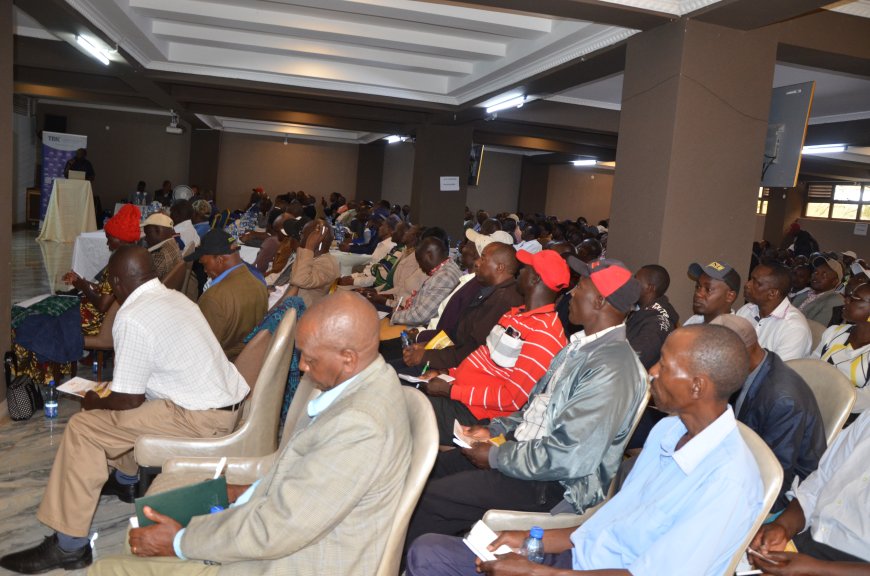Tea Board of Kenya vows to crack the whip on green leaf hawkers

Nyeri,
Sunday, December 17, 2023
KNA by Wangari Mwangi and Samuel Maina
The Tea Board of Kenya (TBK) has raised alarm over the increasing incidents of green leaf hawking in the 16 tea growing counties.
According to TBK chairman Jacob Kamau, the malpractice has become so rampant accounting for Sh 50 billion in lost revenue by smallholder tea farmers.
Additionally, Kamau has warned that if unchecked, the malpractice which pegs more focus on volume, would negatively impact on the quality of tea causing the beverage to record poor absorption rates at the auction.
Consequently, the board is warning factories and farmers of dire legal consequences including revocation of licenses for factories and a sh100,000 fine for a farmer found engaging in the malpractice.
“One of the things that hawking has created is that the quality of our tea has come down. Kenya tea sells because of the quality, yet hawking is keen on encouraging the focus to be kilos and what you realize with the farmer is the quality has come down,” said Kamau.
“There are factories which have lost between 3-5 million kilos but in total, when you look at the loss particularly for the small-scale farmers, we are talking about Sh 53.5 billion in value being lost by the farmers,” he added.
Green leaf hawking is illegal according to Section 6(4) of the Tea Act of 2020.Provisions of the act prohibit a farmer from selling green leaf to any person other than the tea factory where they are registered. Similarly, a tea factory can only buy green leaf from its registered tea growers.
Under the regulations, if a farmer sells tea to another factory where they are not registered the penalty is Sh 100,000 or six months in prison. And if a factory buys tea from a farmer who is not registered under the factory, the fine is Sh 5 million or three years in jail and the vehicle which has been transporting the tea can be forfeited to the state.
“We are trying to enlighten the farmers and those factories that are taking this tea so that they understand that what is happening is an offence,” said the chairman.
“The government is giving farmer subsidies for fertilizers and so it will be unfair for the farmer to receive fertilizer from the government and the factory and then deliver their produce to somebody else. And these are some of the areas we are talking to the farmers about so that we can get a way forward,” stated Kamau.
A survey conducted by the Kenya Tea Development Agency (KTDA) across its seven 7 regions showed that a total of 200 million kilograms of green leaf were hawked in 2021.
Last year, hawking escalated where 60.3 million kilograms of green leaf were hawked leading to the loss of Sh 15.36 billion in earnings for the farmers.
Further, the survey showed the malpractice had gained popularity in four counties that make up Regions 5 and 6 in the growing regions.
The findings revealed that region 5, which covers Kericho and Bomet counties had the highest percentage of hawked green leaf at 42 per cent, while Region 6 which covers Kisii and Nyamira counties hawked 36 per cent of their green leaf.
Third in tea hawking was region 7(Vihiga, Kakamega and Nandi) with an estimated hawking percentage of 15.1.
“Region 1(Kiambu county) had an estimated 5.8 per cent of hawked green leaf, Region 2 covering Murang’a and Nyeri counties as well as Region 3(Embu and Kirinyaga) 0.05 per cent of hawked green leaf,” says findings from the KTDA survey.
On the issue of independent tea factories aiding and abetting tea hawking, Kamau stated that TBK was in the process of reviewing factory licenses to ensure that both private and KTDA managed factories were processing tea according to the license capacity.
He noted that as a way of streamlining the sub-sector, factories wishing to process tea had until the end of this year to submit data detailing their processing capacity as well as the list of registered farmers who deliver green leaf.
“We have gone to some factories where we found they are processing 15 million kilograms while their capacity is 5 million and those are the ones we are saying are going beyond their capacity. But we have given them up to December 31, to tidy up and by January 1, we expect a clean slate,” stated the chairman.
The TBK chair was speaking in Nyeri during a farmers’ engagement forum that brought together more than 300 farmers from the Eastern and Central region, representatives from the office of the Deputy President, the Central region security team, KTDA and private tea manufacturers to discuss the ills that continue to bedevil the tea sub-sector.
During the meeting, the board noted that court cases logged by the former board and management of KTDA were still impeding on the full realization of the tea sub-sector reforms. The board informed the farmers that the petitioners obtained conservatory orders that have cumulatively suspended implementation of 17 sections of the Tea Act.
According to the chairman, many of the provisions that have been suspended were meant to address many of the challenges facing the tea sub-sector.
Kamau however noted that implementation of some of the tea reforms was still on course awaiting the determination of the court on the suspended sections.
Courtesy; KNA
What's Your Reaction?



































































































































































































































































































